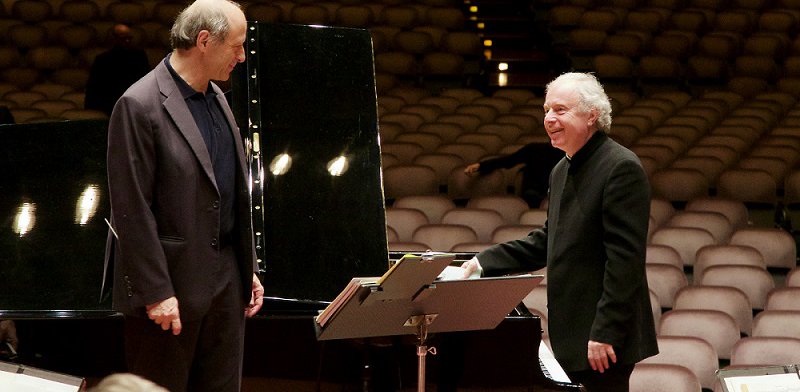Since its inception just over three decades ago under the guiding hand of
Iván Fischer, the Budapest Festival Orchestra has been the stuff of legends, rising meteorically to be counted amongst the top orchestras to grace major stages, and the pride of this youngish ensemble is palpable. Absent is the feeling of musicians who are punching the clock, putting in their hours at just another day at the office which permeates performances – at least from time to time – of many established European orchestras. These musicians are attentive and engaged in their music, both physically and mentally. Already in the opening number,
Schumann’s
Manfred Overture, they offered the lush generosity of tone, dynamic breadth and energetic vigor which would please any conductor and audience.
Sir András Schiff joined the ensemble to perform
Johannes Brahms' First Piano Concerto, a work almost as entangled and complex as Schiff's own relationship with his homeland. Much has already been made of Schiff's open proclamation not to return or play in Hungary due to the reaction after he spoke out against the anti-Semitic turn he perceived the country having taken politically in 2011, so this meeting in Vienna of these Hungarian forces was undoubtedly a weighty thing. Schiff navigated the labyrinth of twists, turns and hemiolas of the lengthy Brahms work with his characteristic critical attention to sound, clarity of expression and sense of architectural shape, and was called to the stage repeatedly by the enthusiastic applause of an appreciative audience, which actually would have left completely satisfied already after the first half.
In brilliant and appropriate programming, however, the second half alternated between four orchestrally accompanied duets by
Dvořák for soprano and alto voices, and three excerpts from
Smetana’s symphonic poem
Má vlast (My Homeland). In a bid to prove the axiom that if an orchestra can sing together, it can play together, the vocal parts of the Dvořák duets were chorally presented by the better part of the females from the orchestra. I would have loved to be present at that particular audition, which I assume went something like this. Fischer: “Very nice Paganini Caprice, Ms Nagy, now can you carry a tune and might you perhaps have a low F in your vocal range?!” Dvořák's vocal works, besides his
Zigeunerlieder and
Biblical Songs, are still somewhat underperformed, and a number of his duets are particularly gorgeous in their simple melancholy. The rustic pictures of lovelorn maidens, calling cuckoos, wreaths on tables, robins on roofs and single apples falling from branches combined with the pure, untrained quality of this deeply musical, vocally untrained ensemble was winning.
Smetena’s programmatic music feels like a sweeping soundtrack to a lost film, which is basically the function that program music is meant to fill; it accompanies a storyline musically without which the music cannot perhaps be most completely appreciated.
Z českých luhů a hájů (From Bohemia’s Woods and Fields) depicts the landscape of his homelands through brilliant filigree, chromatic mini-fugues and compound dance rhythms.
Šárka tells the legend of the Maiden’s War – of revenge, love, dancing and violent betrayal (in that order) using leitmotifs to depict both the heroine and Ctirad, who falls madly in love with her. A dark, dissonant and foreboding “horn” call as Šárka revenges herself upon all of mankind is a particularly gripping moment. The most well-known of the six works from
Má vlast,
Vltava (The Moldau), is renowned for its emulation of rolling and rollicking sounds of nature that spread from the river throughout nature and into the dancing of the people around.
The Budapest Festival Orchestra poured out wave upon wave of euphoric depth, melancholy and sateen-like ensemble with vigor, heart and delightful ability under the guidance of their innately musical founder and conductor.
https://bachtrack.com/de_DE/review-budapest-festival-orchestra-schiff-fischer-vienna-december-2015


